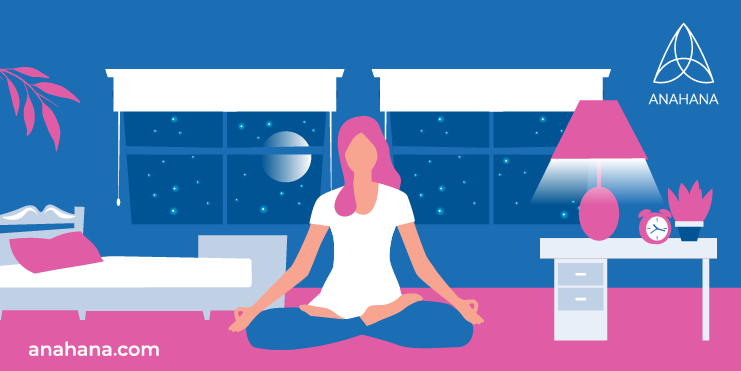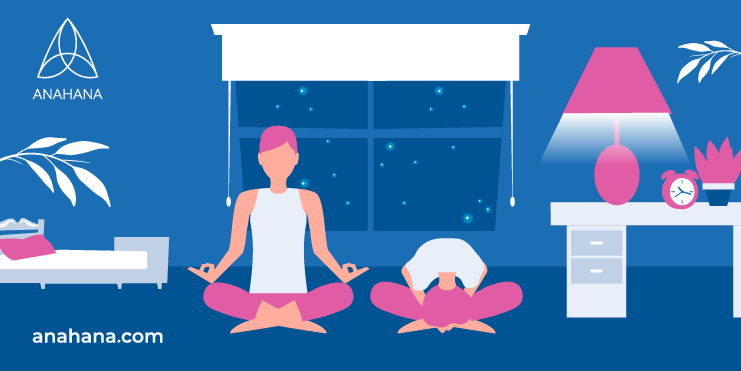Kindness
Kindness means a state of behavior marked by generosity, helpfulness, and consideration without expecting anything in return. It is a positive,...
Meditation is a practice where an individual uses a technique – such as mindfulness or focusing their mind on a particular object, thought, or activity – to train attention and awareness, and achieve a mentally clear and emotionally calm state.
 Night meditation is simply guided meditation practiced at night. While there are many different ways to meditate, night meditation can be a great way to wind down after a long day and prepare for a restful night.
Night meditation is simply guided meditation practiced at night. While there are many different ways to meditate, night meditation can be a great way to wind down after a long day and prepare for a restful night.
In addition to promoting relaxation, it can also help reduce stress, anxiety, and tension. If you’re new to meditation, many resources are available to help you get started, including guided meditations and apps. Once you find a method that works for you, it can be a valuable tool for achieving greater peace of mind and body, eliminating the thinking process, and ensuring you get enough sleep when you are supposed to. Sleeping can be a luxury for some, but even you could enjoy this luxury with sleep meditation.
There are a few common challenges that people face when trying to do night meditation. Here are a few of the most common:
It can be challenging to focus on your breath and mantra when you're tired.
You may find that your mind wanders more at night than during the day.
It can be challenging to stay comfortable for an extended period.
Night meditation can be a great way to relax and drift off to sleep despite these challenges. There are many different techniques that you can try, including self-guided sleep meditations, guided meditations, and apps that provide instruction or mediation music. These are keystones for healthy sleep hygiene, ensuring better sleep. Additionally, there are a few things that you can do to make the most of your nighttime meditation practice session:
Try to find a comfortable position. If you're lying down, make sure your spine is in alignment and not putting any pressure on your neck or back.
Use props such as pillows or blankets to support your body.
Set aside enough time for your session - ideally 20 to 30 minutes.
Avoid distractions by making your meditation space as quiet and peaceful as possible. Using earplugs or playing soft music could be a solution, depending on what works best for you.
Have a plan in place for when you finish meditating. It could be drinking a cup of herbal tea or reading a relaxing book before bed.
Night meditation can be a great way to wind down after a long day and prepare for a restful night’s sleep. In addition to promoting relaxation, night meditation can also help reduce stress, anxiety, and tension and improve sleep. Many resources can help you get started if you're new to meditation, including guided meditations, apps, and online tutorials. So why not give it a try tonight? You just might find that you sleep better than ever before.
 If you want to make the most of your night meditation session, develop healthy sleep hygiene, and make it a part of your daily routine, there are a few key things to keep in mind. Here are a few tips:
If you want to make the most of your night meditation session, develop healthy sleep hygiene, and make it a part of your daily routine, there are a few key things to keep in mind. Here are a few tips:
Find a comfortable position. You can sit in a chair with your feet flat on the ground or lie down on your back. If you choose to lie down, make sure you're comfortable and that your spine is in alignment.
Close your eyes and focus on your breath. Breathe deeply and slowly, letting your belly expand on the inhale and fall back on the exhale. Don't try to control your breath - just let it flow naturally.
Focus your attention on a mantra or positive affirmation. Repeat the mantra to yourself silently or aloud - whichever feels more comfortable. You can also count each breath if that helps to keep you focused.
If your mind wanders, simply notice the thoughts and then let them go. Don't get caught up in thinking about the past or future - just focus on the present moment.
When you're ready to end your meditation, slowly open your eyes and take a few deep breaths. Stretch your body if needed, and then get ready for bed.
While a few challenges come with nighttime meditation, it can be a great way to relax and drift off to sleep. Just remember to find a comfortable position, focus on your breath, and let go of any thoughts that come into your mind. With a bit of practice, you'll enjoy all the benefits of night meditation.
There are a few things that you should avoid while meditating at night to make the most of your session. These include:
Watching television or using electronic devices. The bright light can be disruptive and make it difficult to fall asleep.
Eating a heavy meal. A full stomach can make it difficult to relax or focus on your meditation.
Getting frustrated if you feel like your mind is wandering and having racing thoughts. Meditation takes practice, and it's normal for your thoughts to wander during your session. Notice those thoughts and gently bring your attention back to the present moment.
Meditating for too long without a break. If you're new to meditation, it's best to start slow - especially if you're working towards falling asleep at night. Try 10 or 20 minutes first and gradually increase the time as needed. You will experience the intended mental gratitude and wake up fresh and aware in the morning, ready to begin a new day.
With these tips in mind, you can enjoy nighttime meditation benefits while avoiding common pitfalls that may interfere with falling and staying asleep. So why not give it a try tonight?
 Below we have the best times when you should try this: When is the best time to try this practice:
Below we have the best times when you should try this: When is the best time to try this practice:
Before bed
When you're struggling to sleep or suffering from insomnia
When you need to relax and destress
Night meditation has many benefits, including improved sleep quality, reduced stress and anxiety levels, and increased mindfulness. Some people may find that they struggle to fall or stay asleep at night, mainly if they're dealing with a lot of stress or anxiety. In these cases, practicing night meditation can be a great way to relax and unwind before bedtime. Other individuals may find that they simply need to take some time for self-care each evening to feel more rested and refreshed the next day. Whatever your reason for practicing night meditation, it's an excellent tool for promoting health and wellness, both physically and mentally. So why not give it a try tonight? You just might be amazed by the results!
1. Make sure you're comfortable. Choose a relaxed and comfortable position, and make sure you have enough space to move around if needed.
2. Find a quiet space. Make sure you're in a calm environment where you can focus on your meditation without any distractions.
3. Set a timer. If you're new to meditation, it's best to start with shorter sessions - especially if you're working towards falling asleep at night. Try 10 or 20 minutes first and gradually increase the time as needed.
4. Focus on your breathwork. Just let it flow naturally and focus on the sensations of your breath going in and out of your body. It is essential to practice breathing to ensure sleep and eliminate the thinking process.
5. Let go of any thoughts that come into your mind. When you notice that your attention has wandered, gently bring it back to your breath and focus on the present moment again. With practice, you'll enjoy all the benefits of nighttime meditation without getting frustrated by stray thoughts or other distractions. So why not give it a try tonight? You may just find that this simple practice is just what you need for a restful night's sleep!
 For many people, the thought of meditation conjures up images of sitting cross-legged on a cushion for hours on end. However, meditation can be practiced anywhere and anytime, including before bed. Here are a few tips for beginners who want to try night meditation:
For many people, the thought of meditation conjures up images of sitting cross-legged on a cushion for hours on end. However, meditation can be practiced anywhere and anytime, including before bed. Here are a few tips for beginners who want to try night meditation:
First, find a comfortable position. You can sit in a chair with your feet flat on the ground or lie down on your back. If you choose to lie down, make sure you're comfortable and that your spine is in alignment.
Second, close your eyes and focus on your breath. Breathe deeply and slowly, letting your belly expand on the inhale and fall back on the exhale. Don't try to control your breath - just let it flow naturally.
Third, focus your attention on a mantra or positive affirmation. Repeat the mantra to yourself silently or aloud - whichever feels more comfortable. You can also count each breath if that helps to keep you focused.
Fourth, if your mind wanders, simply notice the thoughts and let them go. Don't get caught up in the thinking processes by thinking about the past or future - just focus on the present moment.
Fifth, when you're ready to end the meditation, slowly open your eyes and take a few deep breaths. Stretch your body if needed, and then get ready for the long-awaited rest.
Most people need around eight hours of sleep per night. However, a few people claim that they only need four to six hours of sleep and that meditation can make up for the rest. While it is true that some people can function with less sleep than others, it is crucial to be aware that meditation cannot replace the benefits of a good night's sleep. Sleep plays an essential role in physical and mental health, and it is not something that’s easily replaced.
The respective goals are what separate sleeping and meditation. While both activities involve rest periods, they differ in the specific benefits offered. Sleep is primarily intended to help us re-energize and recover from the day's stresses, while meditation aims to achieve a more profound sense of calm and well-being. Sleep tends to be subconscious, while meditative practices often require mental focus and intentionality. Ultimately, this tension between effort and surrender makes meditation effective for inducing states of deep relaxation and inner peace. Whether you are trying to improve your sleep habits or looking for new ways to relax, meditation can help you achieve your goal by providing a simple but powerful path to greater peace of mind.
It is important to remember that meditation is a tool, and like any tool, it can be misused. If we meditate for too long or try to force our minds into a state of peace, it can have the opposite effect. We may become anxious or agitated, and our problems may seem unbearable. The key is to find a balance: to meditate often enough to reap the benefits, but not so much that we lose touch with reality. With a bit of practice, we can all learn to use this powerful tool in a beneficial, not harmful, way.
There is no right or wrong answer to this question - it is entirely up to the individual. Some people find that listening to music helps them relax and clear their minds, while others prefer to meditate in silence. If you are new to meditation, it might be helpful to try both options and see what works better for you.
Night meditation can be a great way to relax and drift off to sleep. With these tips in mind, you can enjoy nighttime meditation benefits while avoiding common pitfalls that may interfere with restful sleep. So why not give it a try tonight? You might be amazed by the results, delivering a new sense of life with access to the mind and body you didn't know previously.
How Meditation Helps With Stress
How Meditation Changes The Brain
This is how evening meditation differs from daytime ones
Brief Mindfulness Meditation With Night Nursing Unit Staff: A Qualitative Study

Kindness means a state of behavior marked by generosity, helpfulness, and consideration without expecting anything in return. It is a positive,...

Creating abundance is by shifting the mindset to focus on the things to be grateful for, joy, and presence in the moment through affirmations.

Meet the man at the forefront of the stress reduction battle using mindfulness and meditation.